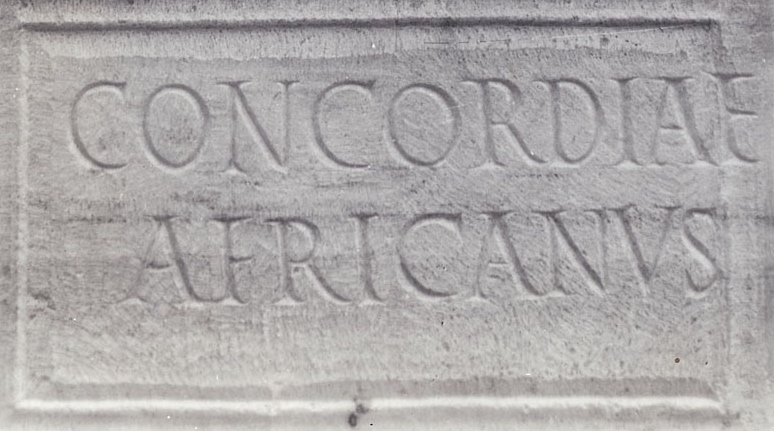Description:
Limestone
block (w:
1.05 x h:
0.68 x d:
0.28;
a bevel on the upper edge reduces the height to 0.40
at the back) damaged at the top; originally part of a simple cornice.
Text: Originally part of a simple cornice, re-used and inscribed on one face;
the inscribed face is badly worn and pitted with deep holes
Letters: Irregular incised capitals: line 1, 0.065; line 2, 3, 0.065-0.08; line 4, 5, 0.05-0.07; line 6, 0.05.
Date: Late fourth - fifth centuries CE (context)
Findspot:
Eastern Jabal:
in the ruins of a ditched gasr
about 6 km north west of Marconi (El Kseia, map ref. M 153, 284)
Original location: Findspot
Last recorded location:
Tripoli Castle.
1: humilitas Oates, 1954
3: AE ligatured.
4-5: The reading at the end of line 4 and the beginning of line 5 is obscure, since the stone is both worn and pitted here. It
would be just possible to read E for A and IT for E, making fuerit, but this is very uncertain.
6: In patrem, TR are apparently in ligature, but the T cannot be regarded as certain. ; At the end of the line there is barely room for exuperan[t] and the traces of the N are very uncertain: exupera[t] is quite possible.
English translation
Translation source: Oates, 1954
[---] By [---] humility and dutiful labour may you achieve all your aims, may you love the one God (?), may you be fortunate, Vabalius. Donatina joyfully (salutes) her father.
English translation
Translation by: J. M. Reynolds
[---] I will fight [---] I toil obediently, as a result of which all those things have been ?completed by me; thus Urbanus ?was fortunate and his wife Donatina who surpass (?survive) the father.
Bibliography: Oates, 1954 2, p.114, whence mentioned AE 1955, page 60; Reynolds, 1955, S.19, whence IRT, 2009, 991, whence EDH 059829;
Images
None available (2021).
